Session 10 - Romans - The Gospel According to Paul
Author
Romans 1:1 indicates that Paul was the author.
"This letter is from Paul, a slave (doulos, or bond slave) of Christ Jesus, chosen by God to be an apostle (lit. "one who is sent", cf 15:16) and sent out to preach his Good News." (Words in brackets are not in the original.)
Romans 16:22 indicates that Paul used a man name Tertius to transcribe it (as his "amanuensis"). It appears that Phoebe, who belonged to the church at Cenchrea near Corinth (16:1), carried the letter to Rome.
Many of Paul's epistles have similar ("Dear Fred .. Yours faithfully, Paul") beginnings and endings, like modern letters.
Date of Composition
Around 56-59. It is the longest and theologically most complete of Paul's letters.
When Paul wrote this epistle (letter) to the church in Rome, the Christian community in that city must have already been in existence for a number of years (Paul did not establish the church). Paul writes that he had desired to visit them "these many years" (15:23). The text indicates that the church was strong enough to help him carry out further missionary activities. They are not called recent converts; they are not treated as having been improperly instructed, but seem to have been organized and well-grounded ("You know these things so well you can teach each other all about them.", 15:14). The letter deals with no major errors in the church. The church was well known in the Christian network (1:8), and not merely because it was in Rome, "the Big Olive".
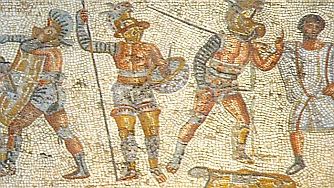
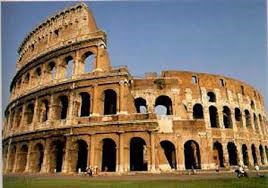
Rome had a large Jewish population (except for periods of official expulsion, eg they were expelled en masse by Claudius in the year 49), and there were both Jews and Gentiles in the church, converts from paganism (1:13, cf 16:26), both free as well as slaves.
How the church started is unclear. There were visitors from Rome in the crowd on the Day of Pentecost (Acts 2:10). Aquila and Priscilla (with whom Paul stayed in Corinth) were from Rome and had returned there by the time Romans was written (16:3). It may be that Christian families or groups from other churches settled in Rome and came together. There may have been several congregations in the city. Paul already knew enough people in Rome to greet 26 of them by name in his letter, even before his arrival. At the outbreak of Neronian persecutions (started in the year 64), Tacitus says that the Christians in Rome were "an immense multitude." The beautiful thing about the Gospel was how it brought culturally diverse people into one church (15:7-13).
Location, Purpose and Audience
"For I am not ashamed of this Good News about Christ. It is the power of God at work, saving everyone who believes - the Jew first and also the Gentile. This Good News tells us how God makes us right in his sight. This is accomplished from start to finish by faith. As the Scriptures say, 'It is through faith that a righteous person has life.' " (1:16, 17).
The epistles are generally divided into the Pauline Epistles and the Non-Pauline epistles. Paul's fall into two categories: nine epistles written to churches (Romans to 2 Thessalonians) and four pastoral and personal epistles (1 and 2 Timothy, Titus and Philemon). These are followed by eight Hebrew Christian epistles (Hebrews to Jude). Naturally, many questions would have arisen as to the meaning and application of the gospel, in the face of persecution and cultural differences. The Epistles answer these questions, give the interpretation of the person and work of Christ, and apply the truth of the gospel to believers cross-culturally.
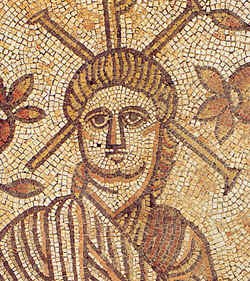
As far as can be established (there are variations across Christian scholarship) the chronological order of the Pauline epistles is (more or less) as follows: First and Second Thessalonians, Galatians, First and Second Corinthians, Romans, Philippians, Colossians, Philemon, Ephesians, First Timothy, Titus, and Second Timothy.
Based on materials in Acts and the two remaining letters to the Corinthians (we are sure that one letter - at least - was lost), Romans was written from Corinth on Paul's third missionary journey (see notes for "Acts" for a map of Paul's missionary trips). Paul had not yet visited Rome; but after fulfilling his mission of mercy to Jerusalem (taking funds for needy Christians there, given by more affluent churches), he hoped to go to Rome en route to Spain (15:23-25). His plans were interrupted when he was arrested in Jerusalem, but ironically ended up in Rome, as a prisoner.
John Stott once said that "Paul's letter to the Romans is a kind of Christian manifesto ... a manifesto of freedom in Christ ... the fullest, plainest and grandest statement of the Gospel in the New Testament" (Stott, 19). It was Martin Luther's reading of Romans, and his discovery of the truth of justification by faith that led, in part, to the Protestant Reformation.
The purpose of Romans is to explain that all have sinned egregiously (we are all guilty before God, without exception), but that salvation is offered through the gospel of Jesus Christ; how a sinner may be received as righteous by a righteous God; and how a justified person should live daily to the glory of God. Let's unpack that.
Romans tell us about God, who He is and what He has done. It tells us of Jesus Christ, and what His death accomplished. It tells us about ourselves, what we were like without Christ and who we are after trusting in Him. Paul points out that God did not demand that men and women have their lives straightened out before coming to Christ. While we were still sinners Christ loved us unconditionally and died for our sins.
Romans makes it clear that there is nothing we can do to save ourselves. When we turn our lives over to Christ, we are no longer controlled by our sin nature, but by the Holy Spirit. If we make confession that Jesus is Lord, and believe that He has been raised from the dead, we are saved, born again. We need to live our lives offered to God as a living sacrifice to Him. Worship of the God who saved us should be our highest desire.
In theological terms, Romans stands as the clearest and most systematic presentation of Christian doctrine in all the Scriptures. Paul begins by discussing that which is most easily observable in the world - the sinfulness (by nature, inheritance, birth and choice - there is no excuse) of all humanity. God gets angry with sin. All people, of all cultures, have been condemned to eternal death due to rebellion against God. Those who not believe in sin just need to read Chapter 1 to see how far humankind has fallen away from God.
However, God in His grace offers us justification by faith in His Son, Jesus. When we are justified by God, by his grace (a free, unmerited gift, 3:24) we receive redemption, or salvation; Christ's blood covers our sin. Our pursuit of God doesn't stop with salvation; it continues as each of us is sanctified - made holy - as we follow Him.
Paul's treatment of all these issues offers a presentation of how a person can be saved from both the penalty and power of sin.
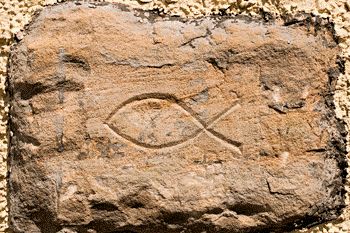
Literary Style and Structure
We lack God's righteousness because of sin (1-3); we receive God's righteousness when He justifies us as a result of our faith (4-5); we demonstrate God's righteousness by being transformed from rebels to followers (6-8) ; His righteousness is confirmed in having a plan in place (ultimately) to save the unbelieving Jews who have rejected Christ and keep His original covenant (9-11); and we apply God's righteousness in practical ways throughout our lives (Chapters 12-16). Many of Paul's epistles have "practical Christian living" passages after doctrinal teaching, ie the doctrines outlined order new behaviours, right belief leading to right living as Christians.
Unlike some of Paul's other epistles, Romans was not written to address specific problems in the church.
Key Ideas
- law (used 78 times); sin (60); faith (39); spirit (29); flesh (26); (24); gospel (13); Israel (12); Jew (11); works (9).
Who are Saints?
"To all that be in Rome, beloved of God, called to be saints" (1:7, KJV)
The New Testament uses the word saint, or saints, 67 times. In every case, the reference is to Christian believers, God's people, who are holy in Christ and being made more like Him. "Saint", or "hagios" in Greek, means "consecrated to God, holy, sacred". It is used to describe the church in Acts 9:13, 32; 26:10; Romans 16:2; 1 Corinthians 1:2; Ephesians1:1; 4:12; 5:3; Philippians 4:21. "Saints" are the body of Christ, Christians, the church. We are all called to live "set apart" from the corruption of the world.
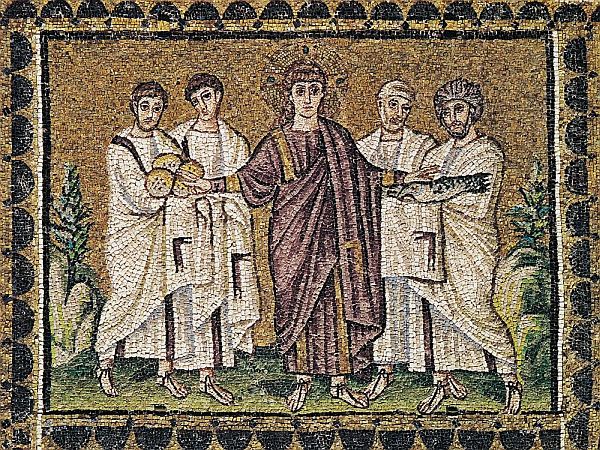
How God has Revealed Himself
- general revelation in creation- Chapter 1
- His law written on our conscience - Chapter 2
- His law given to Israel - Chapter 2
- His Son, Jesus Christ, our Saviour
The fact that God has revealed Himself renders everyone without an excuse for sin.
The Universality of Sin, and its Impacts
Romans 1 depicts the world system and its rebellion against God, turned into idolatry (Rome was centre of the empire's cults, starting with Emperor worship, temples/shrines, sacrifices, temple prostitution). Romans 2 picks up the theme; even those with God's laws have fallen into sin. Romans 3 describes the universality of sin, commencing with Adam, its impacts, and God's judgement. No one is righteousness, no one meets God's perfection. Sin has a stranglehold; only an act of God can break that stranglehold.
The Old Testament Law shows us how far we fall short of God's standards.
"..no one can ever be made right with God by doing what the law commands. The law simply shows us how sinful we are." (3:20).
Human beings cannot achieve God's righteousness through their own efforts. The only solution to the dilemma this creates is God's plan of salvation. We (Jew and Gentile alike) are made righteous only in Christ.
"But now God has shown us a way to be made right with him without keeping the requirements of the law, as was promised in the writings of Moses and the prophets long ago. We are made right with God by placing our faith in Jesus Christ. And this is true for everyone who believes, no matter who we are. For everyone has sinned; we all fall short of God's glorious standard. Yet God, in his grace, freely makes us right in his sight. He did this through Christ Jesus when he freed us from the penalty for our sins. For God presented Jesus as the sacrifice for sin. People are made right with God when they believe that Jesus sacrificed his life, shedding his blood. This sacrifice shows that God was being fair when he held back and did not punish those who sinned in times past, for he was looking ahead and including them in what he would do in this present time. God did this to demonstrate his righteousness, for he himself is fair and just, and he makes sinners right in his sight when they believe in Jesus." (3:21-27)
"there is no condemnation for those who belong to Christ Jesus." (8:1)
Justification is by Faith
"Therefore, since we have been made right in God's sight by faith, we have peace with God because of what Jesus Christ our Lord has done for us. Because of our faith, Christ has brought us into this place of undeserved privilege where we now stand, and we confidently and joyfully look forward to sharing God's glory." (5:1, 2)
Romans 1:17 is an echo of Habakkuk 2:4. Paul uses Abraham's belief in God and trust in Him as an example of God-pleasing, saving faith.
Justified = "just-if-I'd" never sinned. The terms "righteousness" and "justification" come from the same Greek word. Justification means being made right with God, counted as righteous in God's sight (4:11). We have peace with God; we were separated, but now we are reconciled to Him. This comes through faith, in Christ. We are encouraged to have faith the way Abraham did (an example to us, as it turned out), that led to God declaring him to be righteous (4:16, 20-25). He is a "spiritual father" to all who believe".
Adam versus Christ; Death versus Life; Sin versus Grace
Chapter 5 compares the trajectories of Adam (who sinned and died) and Christ, like a second Adam (in whom we are made alive).
"So just as sin ruled over all people and brought them to death, now God's wonderful grace rules instead, giving us right standing with God and resulting in eternal life through Jesus Christ our Lord." (5:21).
Chapters 6 and 7 deal with humanity's struggle against sin (even for those who have been "baptized into Christ, ie believers); chapter 8 reveals that the answers lie in the life of the Spirit. Sin can no longer dictate terms to us (6:1-14).
"Since we have been united with him in his death, we will also be raised to life as he was. We know that our old sinful selves were crucified with Christ so that sin might lose its power in our lives. We are no longer slaves to sin. For when we died with Christ we were set free from the power of sin. And since we died with Christ, we know we will also live with him. We are sure of this because Christ was raised from the dead, and he will never die again. Death no longer has any power over him. When he died, he died once to break the power of sin. But now that he lives, he lives for the glory of God. So you also should consider yourselves to be dead to the power of sin and alive to God through Christ Jesus." (6:5-11).
Adoption
The word "adoption" in the New Testament (Rom. 8:15, 23: 9:4; Gal. 4:5; Eph. 1:5) is translated from the Greek word huiothesia, which means "the placing of an adult son" and refers to the formal act of recognizing the maturity of an adult son. The concept reflects Roman culture in the 1st century. On occasions, the "son" may not have been biologically related to the "father". We were outsiders, in sin, but have been "adopted" as sons. We become heirs of God and joint-heirs with Christ through the work of the Spirit. The Spirit confirms our sonship (8:15, 16).
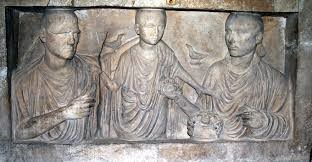
Nothing Can Separate Us from God's Love
"What shall we say about such wonderful things as these? If God is for us, who can ever be against us? Since he did not spare even his own Son but gave him up for us all, won't he also give us everything else? Who dares accuse us whom God has chosen for his own? No one - for God himself has given us right standing with himself. Who then will condemn us? No one - for Christ Jesus died for us and was raised to life for us, and he is sitting in the place of honour at God's right hand, pleading for us. Can anything ever separate us from Christ's love? Does it mean he no longer loves us if we have trouble or calamity, or are persecuted, or hungry, or destitute, or in danger, or threatened with death? As the Scriptures say, 'For your sake we are killed every day; we are being slaughtered like sheep.' No, despite all these things, overwhelming victory is ours through Christ, who loved us. And I am convinced that nothing can ever separate us from God's love. Neither death nor life, neither angels nor demons, neither our fears for today nor our worries about tomorrow - not even the powers of hell can separate us from God's love. No power in the sky above or in the earth below - indeed, nothing in all creation will ever be able to separate us from the love of God that is revealed in Christ Jesus our Lord." (8:31-39)
God's love is us becomes an expression of genuine Christianity:
"If you love your neighbour, you will fulfil the requirements of God's law." (13:8)
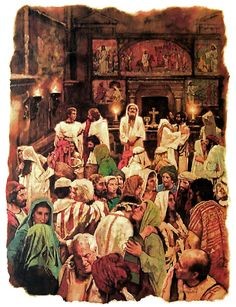
Christianity is a Practical Faith
Romans is theological, but it is also practical. Chapters 12-16 contain much practical teaching about the Christian life. There is a difference between religious obligation and moral living on the one hand, and the motivation of Christians to live by a new constitution, established in understanding the will of God.
"And so, dear brothers and sisters, I plead with you to give your bodies to God because of all he has done for you. Let them be a living and holy sacrifice - the kind he will find acceptable. This is truly the way to worship him. Don't copy the behavior and customs of this world, but let God transform you into a new person by changing the way you think. Then you will learn to know God's will for you, which is good and pleasing and perfect." (12:1, 2).
Stott identifies eight relationships that change when we live by God's will; with God, ourselves, each other, our enemies/those who do wrong to us, the state/governing authorities (even when the state is anti-Christian); the law, getting ready for the last day, and the weak (ie weak in their faith and convictions, or those who are culturally different - they are brothers and sisters, for whom Christ died). (Words in brackets added.)
Christianity is not individualistic; the church is a community of believers, where faith is lived in relation to a diversity of other believers. We intuitively seek uniformity; however, the church is not homogeneous.
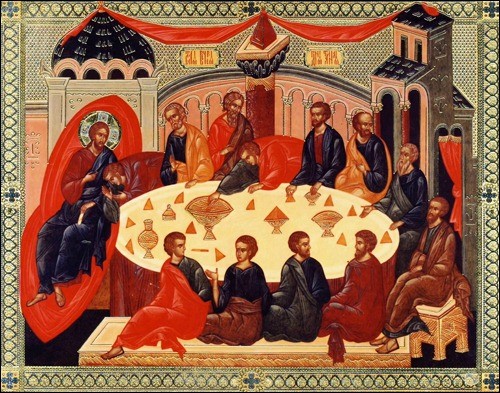
Spiritual Gifts
There are several lists of spiritual gifts (some overlap, others are very different in purpose, authority and scope) in the New Testament:
- gifts (charismata)of the Holy Spirit (9 are enumerated in 1 Corinthians 12:4-11)
- gifts to the church (1 Corinthians 12:28-31; examples, there are many more)
- ministry gifts (offices) from Christ to the church (Ephesians 4:11- their purpose is spelt out in 4:12-13)
- Romans 12:6-8:
"In his grace, God has given us different gifts for doing certain things well. So if God has given you the ability to prophesy, speak out with as much faith as God has given you. If your gift is serving others, serve them well. If you are a teacher, teach well. If your gift is to encourage others, be encouraging. If it is giving, give generously. If God has given you leadership ability, take the responsibility seriously. And if you have a gift for showing kindness to others, do it gladly."
We are to fulfil our callings and giftings with obedience and diligence. Paul said that He served God with all his heart (1:9, cf 15:19-21).
"Never be lazy, but work hard and serve the Lord enthusiastically" (12:11)
There is a lesson in there for each of us.
Remember, we are not equipped by God to serve ourselves, but to serve others, in a spirit of humility, and bring glory to God:
"I have reason to be enthusiastic about all Christ Jesus has done through me in my service to God. Yet I dare not boast about anything except what Christ has done through me," (15:17, 18).
Finally,
"Oh, how great are God's riches and wisdom and knowledge! How impossible it is for us to understand his decisions and his ways! For who can know the Lord's thoughts? Who knows enough to give him advice? And who has given him so much that he needs to pay it back? For everything comes from him and exists by his power and is intended for his glory. All glory to him forever! Amen." (11:33-36)
What a remarkable declaration!
For Reflection:
- "Let me say first that I thank my God through Jesus Christ for all of you, because your faith in him is being talked about all over the world." Do others know about your faith in Christ?
- "God knows how often I pray for you. Day and night I bring you and your needs in prayer to God." Do you pray for those in your sphere of influence?
- "And because you belong to him, the power of the life-giving Spirit has freed you from the power of sin that leads to death." (8:2). Is this your experience?
- ".... you also should consider yourselves to be dead to the power of sin and alive to God through Christ Jesus" (6:11). If you are dead to sin and alive to God how should you live each day?
- "Sin is no longer your master, for you no longer live under the requirements of the law. Instead, you live under the freedom of God's grace." (6:13). Ask the Holy Spirit to show you how to work this out in real life.
- God establishes rulers and laws; how can you approach government and political realities from this perspective?
- Think about someone whose life doesn't match up to your expectations as a Christian. Now read Romans 14 and see how you can think differently about them.
- Paul expected to encounter trouble when he arrived in Jerusalem with the churches' gifts for the poor ((15:24, 28, 32). How do you deal with anticipated problems as you step out to do the will of God?
- "Now all glory to God, who is able to make you strong" (16:25). Claim this each and every day.
Further readings:
F. F. Bruce, The Epistle of Paul to the Romans, in the Tyndale New Testament Commentaries series
Stott, J. (1994). The Message of Romans: God's good news for the world, Inter-Varsity Press, Nottingham







